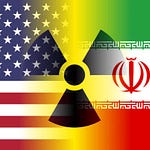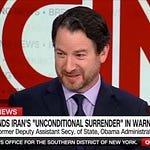When the news came of a ceasefire between Israel and Iran - brokered with typical flourish by Donald Trump - there was collective whiplash across the country. Could this really be happening? After decades of low-grade warfare, two weeks of Israeli bombardments, multiple Iranian ballistic missile strikes, and American mountain-busting bomb drops, had Israel and Iran actually agreed to stop shooting?
The answer, simply put, is yes.
But this ceasefire is inherently unstable and we must not rest on our laurels. Now is the time to lock in the battlefield gains that have been made to ensure that Iran doesn’t obtain a nuclear weapon, nor has the enrichment capacity to do so.
Let’s quickly recap. After roughly two weeks of war, the worst fears haven’t happened. Iranian retaliatory strikes were minimal and contained. There was no spiraling conflict in Lebanon or Syria. No missile barrages from the Houthis. The Straits of Hormuz remained open. No American service members died and American military forces are not on the verge of a massive ground invasion that could cost thousands of lives. None of these doomsday scenarios has occurred. For that, we should breathe a sigh of relief.
However, achievement of the core objective of both Israeli and American military action - to end Iran’s nuclear program and its enrichment capacity - is unclear. A fully vetted Battlefield Damage Assessment has yet to be made public and independent third parties, like the International Atomic Energy Agency (IAEA) have also not fully weighed in. There is good reason to believe that the program has been decimated and set back, but as of yet, official confirmation about its status remains elusive.
However, what we do know is that Iran had enough of the fight and was ready to stop. Its air defenses were deeply damaged and its ability to project power severely constrained. But it did do damage in Israel that should not be overlooked, with many buildings destroyed by ballistic missiles and many civilians killed (in addition to many Iranian civilians being killed). With the Iranian regime weakened, Israel’s overall sense of security has dramatically increased, its fears of a nuclear Iran reduced, and the region is still standing.
The United States should therefore take concrete steps now to do more than just congratulate ourselves. Here’s how.
First, let’s supercharge diplomacy. Ceasefires are not self-executing. They need monitoring, enforcement, and, above all, momentum. President Trump must lead the charge for a broader diplomatic framework - one that brings in our Gulf allies, the Europeans, and possibly even adversaries like China and Russia, all of whom have a core stake in regional stability. There needs to be direct U.S.-Iran engagement, the multilateral channels that once existed under the Iran nuclear deal need to be reestablished, and regional mediators must be empowered to play bridge roles.
The goal of these talks should be a permanent Iranian commitment to verifiably eliminate its nuclear enrichment program, an objective that it shrugged off for the past two months, resulting in its military pummeling. And if it does not agree, it must know that all options, including military ones, will remain on the table.
Second, we must resist the seduction of pushing for externally imposed regime change. For too long, some have peddled the fantasy that if only the autocratic Iranian regime fell by our hand, would peace bloom across the Middle East. This mindset has led to disastrous outcomes in other parts of the region, including Iraq and Libya. The courageous Iranian people do not need American bombs to do their work. They need support, solidarity, and sanctions relief tied to human rights improvements to change their country from within. We should keep a close watch on this space, nudge it forward, and be welcoming if it were to occur. Our goal should continue to be to change the regime’s behavior, not to militarily change the regime.
Lastly, we must acknowledge that President Trump’s decision to drop bombs on Iran was made with barely any Congressional engagement, undermining broad bipartisan support for his strong decision. That’s the result of our having a weak Legislative Branch on foreign policy and a president who views legal requirements as annoying words, rather than Constitutional priorities. That needs to change and Congress, which has the power to authorize war - if it chooses to use that power - needs to step up and be proactive about what it wants both from the Commander in Chief and from Iran policy. Until it does, on a bipartisan basis, Trump will continue to stretch the boundaries of his military authorities and we will lack the broad national resolve we need to confront national security threats like Iran’s nuclear program.
Of course, it’s tempting to say that this ceasefire moment is just a pause before the next blowup. And perhaps it is. But even pauses matter. They provide opportunities to shift trajectories. They open space for dramatic changes. They offer the chance to rebuild shattered trust. But only if they’re leveraged for that purpose.
That’s why, if we turn-on the diplomacy, eschew regime change, and build broad bipartisan political support for an effective Iran policy, then maybe, just maybe, we’ll look back at this moment not as a blip, but as a turning point in ending Iran’s nuclear program and the need for more war.
Let’s make sure that such an outcome has a fighting chance.













Share this post